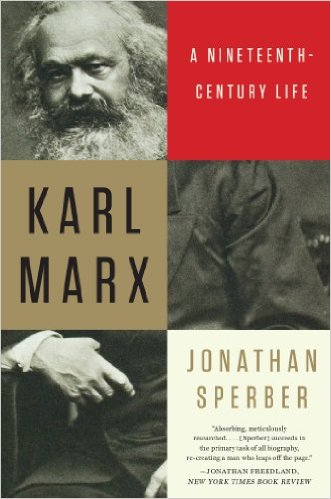
In a new biography of Karl Marx, the historian Jonathan Sperber set out to explain his subject in the context of nineteenth-century circumstances and attitudes. “Marx was not our contemporary,” he writes, “[but] more a figure of the past than a prophet of the present.” He concludes that the way we view the man today is substantially different from the way he was viewed by his contemporaries — or the way he viewed himself. However, to my mind, he’s only partially successful.
Estimated reading time: 5 minutes
Karl Marx, the armchair revolutionary
In one important way, Sperber makes his case with a detailed recitation of Marx’s decades-long career as a journalist and activist. The book is at its strongest in describing the evolution of his thinking from the 1830s, when he was a student of philosophy and enamored of the work of Georg Wilhelm Friedrich Hegel. In the 1840s and 50s, as Marx became progressively more engaged in writing (and arguing) about politics, he grew hostile toward Hegel and his followers, often engaging in acrimonious public debates about the philosopher’s work. During that period, his politics bore no resemblance to the beliefs he professed even a few years later. As Sperber notes about a polemic Marx penned in 1843, “The man who would write the Communist Manifesto just five years later was advocating the use of the army to suppress a communist workers’ uprising!”
Karl Marx: A Nineteenth-Century Life by Jonathan Sperber ★★★★☆
Marx “had much more success in founding a radical political newspaper than in organizing the working class.” He appears to have come closest to becoming actively engaged in political action during the Continent-wide wave of revolutions in 1848, but even then his involvement was limited to intellectual fisticuffs. Later, as his fame grew through the 1860s, Marx became even more insulated from political action. Instead, he grew preoccupied with sectarian debates among the many small and ineffectual Communist organizations that sprang into being in mid-century and devoted most of their energy to quarreling among themselves. Marx wrote hundreds of thousands, perhaps millions of words about revolution. The most common thread among all these writings was that he was wrong about nearly every prediction he ever made. For decades on end, he continued to predict that the revolution that would overthrow capitalism was just around the corner.
Karl Marx, the theorist
Self-described Communists in the twentieth century idolized Marx as the patron saint of their movement. However, Marx himself would not have recognized what has passed as Communism since the Russian Revolution of 1917. Latter-day Communists have built much of their ideology around imperialism, following Vladimir Lenin’s reformulation of the gospel according to Marx. By contrast, Marx did not view capitalism and imperialism as integrally linked. In fact, he often wrote favorably about the British Raj, implying that the British had helped drag millions of Indians out of a more primitive state by introducing them to civilization. In other ways as well, the tortured historical analysis Marx laid out in his many books and thousands of essays and articles bore little resemblance to the simplistic logic of twentieth-century Communism. Marx would have been scandalized by Lenin, Stalin, and Mao. He was not a Marxist.
Karl Marx, the anti-Semite
One of the recurring themes in Sperber’s biography is that Marx was not a self-hating Jew even though he wrote disturbingly anti-Semitic statements on many occasions. The “‘Israelite faith is repulsive to me,'” he wrote in 1843. Later, he “explicitly endorsed the view of Judaism as an ethically inferior religion.” On other occasions, he described other Jews individually using pejorative, anti-Semitic terms.
Sperber attempts to make his case by asserting that in the mid-nineteenth century, Jews were not viewed through the lens of biology as a “race.” That only came later with the emergence of Social Darwinism. Instead, Jews were defined by religion and culture; since Marx was neither a practicing Jew (his father had converted to Protestantism, and Marx himself married a Protestant woman) nor did he identify with Jewish culture, he was free to engage in talking and writing about Jews in a highly disparaging manner. The argument falls flat. For many centuries, Jews had been persecuted throughout Europe, not because of their religion or cultural practices but simply because they had descended from Jewish ancestors. To understand this fact, all you need do is look to the persecution of conversos (Jews converted to Catholicism) by the Inquisition.
Karl Marx, the man
In Sperber’s telling, Marx was a loving husband and a doting father and grandfather. Nonetheless, he routinely took steps in his life as a journalist that guaranteed he and his family a life of poverty. Until the 1870s, when Friedrich Engels finally inherited a fortune and was able to support the Marx family in a semblance of comfort, Marx, his wife, and the three of his many children who survived into adulthood lived hand-to-mouth, forever begging, borrowing, and dodging creditors. And Marx fathered an illegitimate son on the family’s long-time, live-in maid.
In his personal relationships outside his family, Marx was no more considerate. He was combative and often nasty and vindictive. Much of his writing consisted of lengthy diatribes attacking his personal enemies — who were often former friends with whom he had parted company on one or another minor point of ideology. Typically, the reason he had grown so hostile to them was that they continued to advocate beliefs he had once held himself.
In one of the many unfinished manuscripts Marx wrote, he devoted “about 65 percent of the 517 pages . . . to a distinctly minor figure who died soon afterward in obscurity.” Sperber adds, “internecine conflict became an obsession for Marx and Engels.” Marx even quarreled, sometimes to the point at which they cut off relations, with Engels, who was the closest he ever had to a brother. In fairness, Engels was widely viewed as an even nastier fellow whose “tactless remarks and excessive behavior had alienated fellow leftists.” Even so, Karl Marx was not a guy you’d likely want to become your best friend.
About the author
Jonathan Sperber is a history professor at the University of Missouri. He teaches modern European history. Karl Marx is his eighth book.
For related reading
Like to read good biography? Check out 10 great biographies.
If you enjoy reading nonfiction in general, you might also enjoy:
And you can always find my most popular reviews, and the most recent ones, on the Home Page.



























